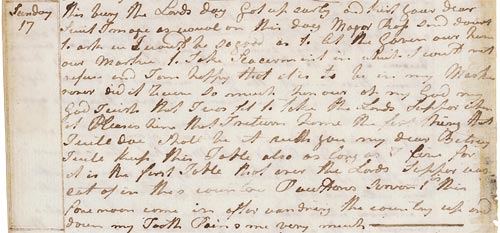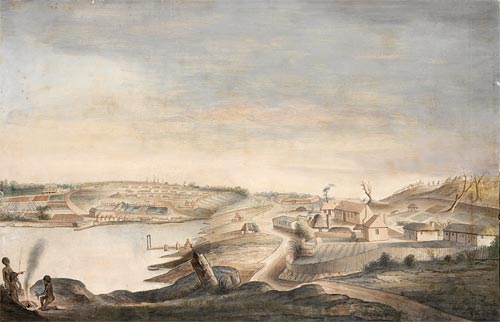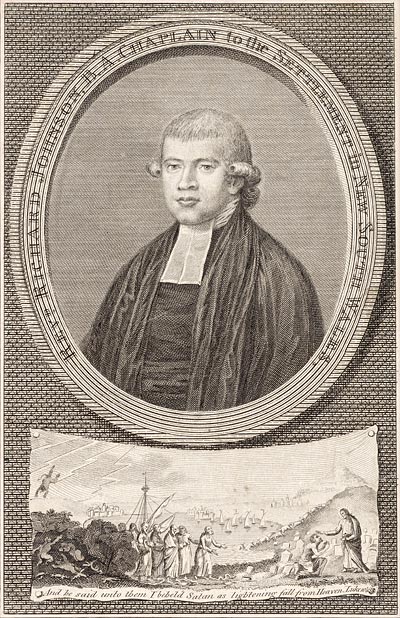The Early Years
The First Fleet anchored in Sydney Cove on January 28, 1788. On the following Sunday, February 3, the first church service was held for the officers, marines and convicts on Australian soil. The service was led by the colony's Chaplain, the Reverend Richard Johnson, on a grassy hill under a tree. He chose for his text the twelfth verse of Psalm 116, "What shall I render unto the Lord for all his benefits towards me?"
Two weeks later on February 17, Rev. Johnson celebrated the first Communion in the colony. The service was held in Lieutenant Ralph Clark's tent, borrowed for the occasion. The event was recorded by Clark in his journal. 'I will keep this Table also as long as I live for it is the first Table that ever the Lords Supper was eat of in this country'

Journal extract, Feb 17, 1788 by Ralph Clark
Manuscript, 1/27a
In the early years of the colony religion played a difficult and unpopular role.
As an evangelical minister, Rev. Richard Johnson saw his role as an opportunity to convert the convict population and the native inhabitants to Christianity.
As a military officer, Governor Phillip believed the Church provided a necessary code for social order and control. The commission received by Governor Phillip in 1787 requested only that "Due observance of religion and good order among the inhabitants of the new settlement, and that you do take such steps for the due celebration of publick worship as circumstances will permit".
In November 1788, Rev. Richard Johnson wrote to Henry Fricker of Portsmouth, England, a friend of the Johnson family. Amongst personal news Johnson describes the arrangements for religious observances at Rose Hill, the Governor's reluctance to build a church and the irreligious lives of the convicts.
For the first five years Johnson was solely responsible for performing services throughout the colony. He travelled up to Parramatta every second Saturday. It took around five or six hours to travel the fourteen miles up the river to the settlement. He would then give a sermon at Toongabbie around seven on Sunday morning and two services at Parramatta later in the day. Services at Sydney Cove and further west were held in the open air or in makeshift buildings In bad weather or if the Chaplain was ill the services were cancelled. Despite numerous requests from the chaplain for land, funds and labour, a proper church was not provided. Another of Johnson's concerns was the poor attendance at services.
In 1791 Governor Phillip issued an Order for attendance at divine service. Rations for non-attenders were to be reduced, to two pounds of meat for every overseer, and one and a half pounds for every convict, The Order was not enforced nor did any penalty apply to Officers or Marines.
Reverend Richard Johnson, 1787, by G. Terry
Engraving, P1/J
In the circumstances, Governor Phillip's reluctance to support Johnson's requests was not surprising. The need to feed, house and control the activities of an increasingly dissatisfied and expanding population was a far greater priority.
In 1794 Reverend Samuel Marsden arrived in the colony to assist Rev. Johnson. His impression of the colony and the moral state of the inhabitants quickly agreed with that of Johnson. In October 1795 Rev. Marsden wrote to Mary Stokes in England about conditions in the Colony.
'The Enemy hath so completely possessed himself of the Minds of all Ranks and Orders here; that it is a Matter of Doubt with me, that his Power will be ever seen in this Place to fall like Lightning from Heaven'

Sydney Cove, 1794, by unknown artist
Oil, V1/1794/1



